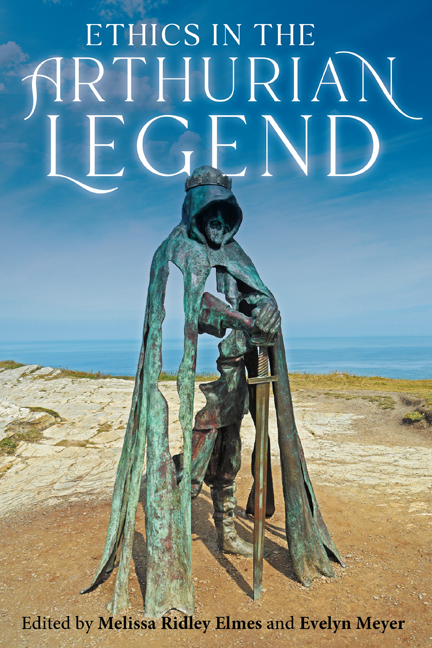Book contents
- Frontmatter
- Contents
- List of Contributors
- Foreword
- Acknowledgments
- Introduction
- 1 Arthurian Ethics before the Pentecostal Oath: In Search of Ethical Origins in Culhwch and Olwen
- 2 Too Quickly or Not Quickly Enough, Too Rash and Too Harshly: The Arthurian Court’s Lack of Ethics in Hartmann von Aue’s Erec and Iwein and Wolfram von Eschenbach’s Parzival
- 3 The Ethics of Arthurian Marriage: Husband vs Wife in Hartmann von Aue’s Iwein
- 4 Arthurian Ethics and Ethical Reading in the Perlesvaus
- 5 Translation Praxis and the Ethical Value of Chivalry in the Caligula Brut
- 6 Imperial Ambitions and the Ethics of Power: Gender, Race, and the Riddarasögur
- 7 Lowland Ethics in the Arthur of the Dutch
- 8 Contesting Royal Power: The Ethics of Good Lordship, Sir Gawain and the Green Knight, and the March of Wales
- 9 “As egir as any lyoun”: The Ethics of Knight-Horse Relationships in Lybeaus Desconus
- 10 Malory’s Ethical Dinadan: Moderate Masculinity in a Crisis of Hypermasculine Chivalry
- 11 Virtus, Vertues, and Gender: Cultivating a Chivalric Habitus in Thomas Malory’s Tale of Sir Gareth
- 12 Kingly Disguise and (Im)Perception in Three Fifteenth- Century English Romances
- 13 “Adventure? What is That?” Arthurian Ethics in/and the Games We Play
- 14 The Ethics of a New Edition of Sir Thomas Malory’s Le Morte Darthur – and More Evidence for the Superiority of the Winchester Manuscript
- 15 The Ethics of Writing Guinevere in Modern Historical Fiction
- Afterword
- Index
13 - “Adventure? What is That?” Arthurian Ethics in/and the Games We Play
Published online by Cambridge University Press: 10 January 2024
- Frontmatter
- Contents
- List of Contributors
- Foreword
- Acknowledgments
- Introduction
- 1 Arthurian Ethics before the Pentecostal Oath: In Search of Ethical Origins in Culhwch and Olwen
- 2 Too Quickly or Not Quickly Enough, Too Rash and Too Harshly: The Arthurian Court’s Lack of Ethics in Hartmann von Aue’s Erec and Iwein and Wolfram von Eschenbach’s Parzival
- 3 The Ethics of Arthurian Marriage: Husband vs Wife in Hartmann von Aue’s Iwein
- 4 Arthurian Ethics and Ethical Reading in the Perlesvaus
- 5 Translation Praxis and the Ethical Value of Chivalry in the Caligula Brut
- 6 Imperial Ambitions and the Ethics of Power: Gender, Race, and the Riddarasögur
- 7 Lowland Ethics in the Arthur of the Dutch
- 8 Contesting Royal Power: The Ethics of Good Lordship, Sir Gawain and the Green Knight, and the March of Wales
- 9 “As egir as any lyoun”: The Ethics of Knight-Horse Relationships in Lybeaus Desconus
- 10 Malory’s Ethical Dinadan: Moderate Masculinity in a Crisis of Hypermasculine Chivalry
- 11 Virtus, Vertues, and Gender: Cultivating a Chivalric Habitus in Thomas Malory’s Tale of Sir Gareth
- 12 Kingly Disguise and (Im)Perception in Three Fifteenth- Century English Romances
- 13 “Adventure? What is That?” Arthurian Ethics in/and the Games We Play
- 14 The Ethics of a New Edition of Sir Thomas Malory’s Le Morte Darthur – and More Evidence for the Superiority of the Winchester Manuscript
- 15 The Ethics of Writing Guinevere in Modern Historical Fiction
- Afterword
- Index
Summary
Introduction
The title of this essay comes from one of the most iconic scenes in medieval German Arthurian romance. The episode occurs near the beginning of Hartmann von Aue's Iwein. Riding through the forest in search of adventure, the knight Kalogrenant comes upon a clearing, where he finds a flock of wild animals presided over by a ferocious-looking herdsman. Kalogrenant states the purpose of his journey, namely, to seek adventure, and receives the title question in response: “Adventure,” asks the herdsman, “what is that?” (âventiure, waz ist daz). Taken aback, Kalogrenant goes on to explain that he is a knight and knights seek adventure. The bemused herdsman finally points Kalogrenant toward a fountain where, if the knight pours water on the stone nearby, he may find what he seeks. Kalogrenant follows these directions, only to be unhorsed by the knight who defends the fountain. Kalogrenant returns to Arthur's court, where he then relates his unfortunate encounter to Iwein and his comrades ten years later.
The question “adventure, what is that?” is never again explicitly asked in the poem. I suggest, however, that the romance of Iwein itself becomes an answer. The herdsman's query resonates through Iwein's subsequent encounters, revealing an underlying anxiety about the nature of knightly adventure (Is adventure good? Are knights good?). Hartmann's contemporary Wolfram von Eschenbach even more overtly interrogates the concept of adventure through frequent use of gaming analogies and metaphors. In book VI of Parzival, for example, Segramors downplays his defeat at Parzival's hand, saying that “chivalry is diceplay”(ritterschaft ist topelspil; line 289.24), likening knightly pursuits to a game of chance, or a roll of the dice. Parzival believes he has played the chivalric game well thus far, and the Arthurian court reinforces this belief with its acclaim, until Cundrie's rebuke drives him from the Round Table to search for the Grail. His prior success is illusory. In fact, Parzival's mother has died of grief, he has assaulted a woman who was then further mistreated by her angry husband, and he has ignored the suffering at the Grail castle.
- Type
- Chapter
- Information
- Ethics in the Arthurian Legend , pp. 296 - 324Publisher: Boydell & BrewerPrint publication year: 2023

